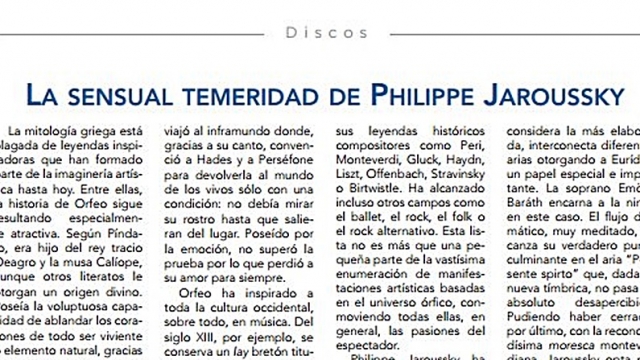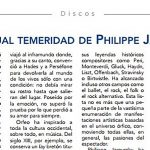2017-03, Ritmo, by Delia Agúndez
Source/Read more: [x]
~ This is a fan translation; no infringement of copyright is intended. If you have any objections of this being online, drop us a message and we will take it down immediately. Translation by *L ~
The sensual audacity of Philippe Jaroussky
Greek mythology is jammed with inspirational legends that are a part of artistic imagery to this day. Among them, the history of Orpheus remains especially attractive. According to Pindar, he was the son of the Thracian king Oeagrus and the muse Calliope, although other writers grant him a divine origin. He possessed the sensual [span: voluptupso] ability to soften the hearts of every living being or natural element by his singing and his poems. By and by, in Ancient Greece, other merits and abilities were attributed, such as perfecting the lyre invented by Hermes, writing the Orphic Hymns, improving medicine and agriculture or mastering astrology and clairvoyance.
There are various episodes that revolve around him, although the most powerful one is the story of the loss of his wife Eurydice, on the day of his wedding. The sources contain exciting variations, but all agree that during this beautiful day, his beloved was bitten by a viper. Broken with pain, Orpheus traveled to the underworld where, thanks to his song, he persuaded Hades and Persephone to return Eurydice to the world of the living only on one condition: he should not look at her face until they left the underworld. Overwhelmed by emotion, he failed the test and lost his love forever.
“Throughout the centuries, composers such as Peri, Monteverdi, Gluck, Haydn, Liszt, Offenbach, Stravinsky and Birtwistle have narrated their historical legends”
Orfeo has inspired all of the western culture, especially when it comes to music.From the thirteenth century, for example, a Breton lai called Sir Orpheus has been preserved and, over the centuries, composers such as Peri, Monteverdi, Gluck, Haydn, Liszt, Offenbach, Stravinsky and Birtwistle have narrated their historical legends. Orpheus has even reached other fields such as ballet, rock, folk or alternative rock This list is but a small part of the vast roster of artistic works based on the Orphic universe, all of them deeply stirring the emotions of the audience.
Philippe Jaroussky has been the last one who has dared to tell the story of Orpheus and Eurydice from his point of view. In its last disc, it has conformed its particular legend starting from three key works in the History of the opera of century XVII: Orpheus of Claudio Monteverdi (1607), Orphee of Luigi Rossi (1647) and L’Orfeo of Antonio Sartorio ( 1674).
La storia di Orfeo
With La Storia di Orfeo, the singer says to fulfill a long-desired dream and claims to have found, in his character, an adequate balance between the Orphic character of the demigod and the weakness of a deeply human soul. On the other hand, although he respects the original arrangements of Rossi and Sartorio, designed for a countertenor, he has faced the delicate task of adding a different color to Monteverdi’s tenor-like timbre [span: timbre atenorado], something that even Jaroussky himself has sympathetically described as audacity.
He created a careful selection of numbers extracted from these three operas, joining them in an independent but logical cantata for two soloists and choir, with Orpheus and Eurydice as the protagonists. Beginning with the overture of Sartorio, which he considers the most elaborate, it interconnects different arias giving Eurydice a special and important role. The soprano Emöke Baráth incarnates the nymph. The dramatic flow, well thought out, reaches its true climax in the aria “Possente spirto” that, given its new timbre, does not at all pass unnoticed. Having completed the feast of famous Monteverdi, Jaroussky opts for “Lasciate averno” by Rossi, thus not renouncing the transfiguration of the poet, but leaving his own signature.
Undeniably, the Frenchman makes a bold proposal that is worth defending seriously. However, he has something essential in his favor. An Orfeo of the 21st century, he is able to subtly conquer the hearts of an audience that adores him. If, on countless occasions, he has evoked deep affection with his interpretations of Italian Baroque Music, why shouldn’t this provide an original opportunity to to fall in love all over again? His version in concert will provide the answer.
Delia Agúndez


